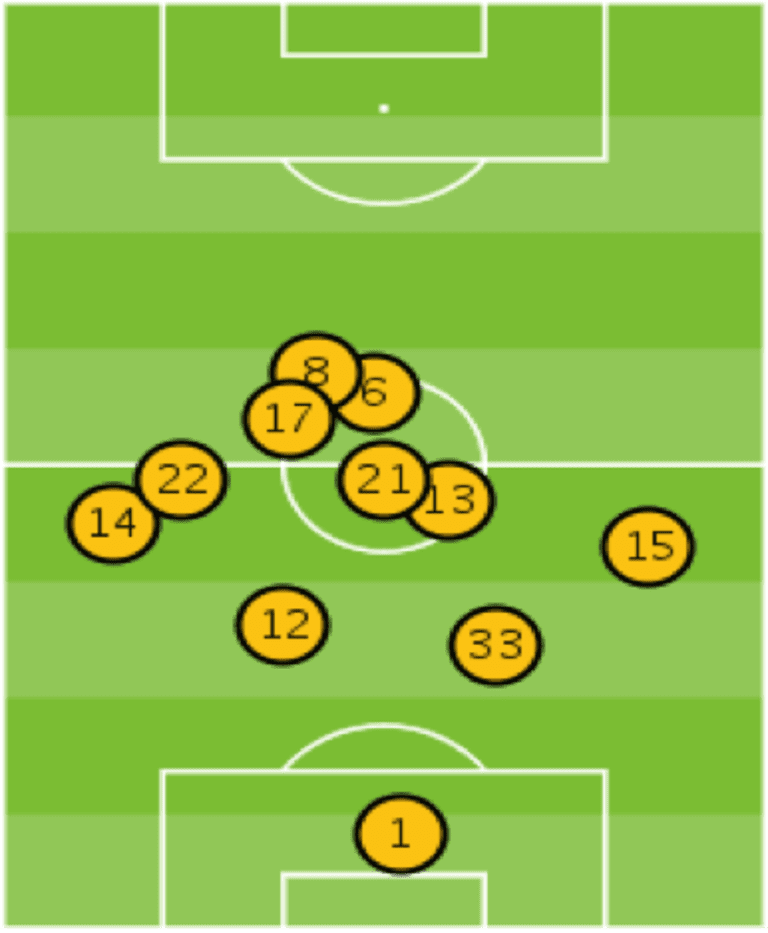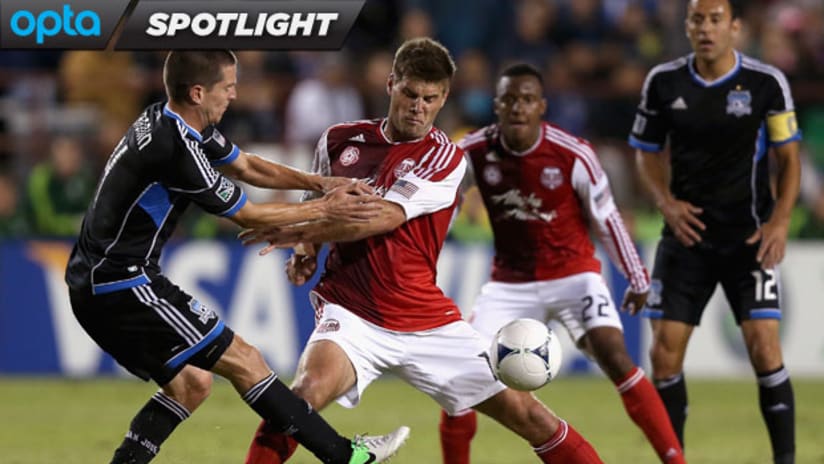Over the next three weeks, MLSsoccer.com will take a look back at the 2012 season that was for all 19 clubs in Major League Soccer, starting with Toronto FC and ending with the Supporters' Shield-winning San Jose Earthquakes. You can find the schedule and comprehensive reviews for each team here.
2012 record: 8-16-10 (34 points); 34 GF / 56 GA (-22 GD)

2012 in Review: Portland Timbers
Q&A with Timbers GM Gavin Wilkinson
Armchair Analyst: Can 4-3-3 work?
2012 Portland Timbers Average Position

The two players farthest forward above are not who you would guess. No, it's not Kris Boyd (he didn't even play enough to make it onto the graphic). It's Franck Songo'o (8) and Darlington Nagbe (6).
Now, that's a good sign in the sense that Nagbe is beginning to understand his role, second striker, and Songo'o is as advertised, a technically proficient player with attacking tendencies. It's not a good sign, however, when it comes to the production of Portland's strike corps in 2012.
Will Boyd be around in 2013? Will Bright Dike continue to show the positive signs that earned him a Nigeria call-up? Will Danny Mwanga finally make good on all that potential? Something's got to give for the Timbers to reach their first postseason, that's for sure.
2012 Portland Timbers Passing Matrix(Download HERE)
This team relied on a pair of midfield metronomes during 2012: Diego Chara and Jack Jewsbury, who led the team in completed passes with 1,072 and 1,173. Nagbe was just behind at 1,054, and the ball clearly ran through the trio.
To no one's surprise, Boyd was barely a factor when it came to build up, completing just 230 passes in 26 appearances. Of course, that wasn't his job in John Spencer's system. Spencer is gone, though, and Boyd and the rest of Portland's strikers are going to have be more willing to play with the ball at their feet under Caleb Porter.
Of the three mentioned above, that may suit Mwanga the best, although Dike showed the most promise late in the season. Still, we haven't yet seen José Adolfo Valencia, otherwise known as "El Trencito." Could he be the best fit of all? That's for Porter to find out.
1) The Timbers scored six fewer goals during 2012 than in 2011, why?
Portland took almost 40 more corners this year than last. Their crossing accuracy was up across the board, albeit with slightly less frequency. Their touches on the ball increased by more than 1,500, including a bump in the final third and opponent's penalty area.
And yet the Timbers were less productive in the final third, mostly because they were slightly less polished in the penalty box. Although goals from outside the area rose from four to seven in 2012, Portland's goal percentage on attempts inside the 18-yard box dropped more than six percent. Over the course of an entire season, that's significant.
So significant, in fact, that the club saw goals inside the box drop from 36 to 27. That falls on Boyd and Co.
2) The Timbers defending in the penalty area also took a hit ... or were they just unlucky?
Portland conceded eight more goals during their second season in MLS (56 vs. 48), but they experienced a 10-goal jump in the penalty area (45 vs. 35).
Surprisingly, they actually allowed fewer shots in 2012, but it seems those that were taken were of higher quality based on the jump in goals, shots in the box and save percentage.
Of course, the Timbers could also have just been fortunate during 2011: 16 shots hit the woodwork last year as opposed to six in 2012.
3) Lack of big chances says something about Portland's attack
I hate to keep harping on big chances, but they're one of the best metrics for chance creation you'll find these days. The more you have, the more your attack was able to create an opportunity that should result in a goal.
It's no shock that San Jose finished first in that category. On the other hand, Portland finished second to last with 31 big chances created – as many big-chance goals as the Quakes scored. It's no surprise, then, that the Timbers attack was the second worst in MLS, behind only anemic Chivas USA.
The fault lies across the board. Chances are created as a team, and Portland simply didn't have the players or the tactical approach necasarry to regularly put themselves in position to find the back of the net.
Random nugget: The Timbers cleared four shots off the line in 2012 after being forced to do so just once in 2011.













